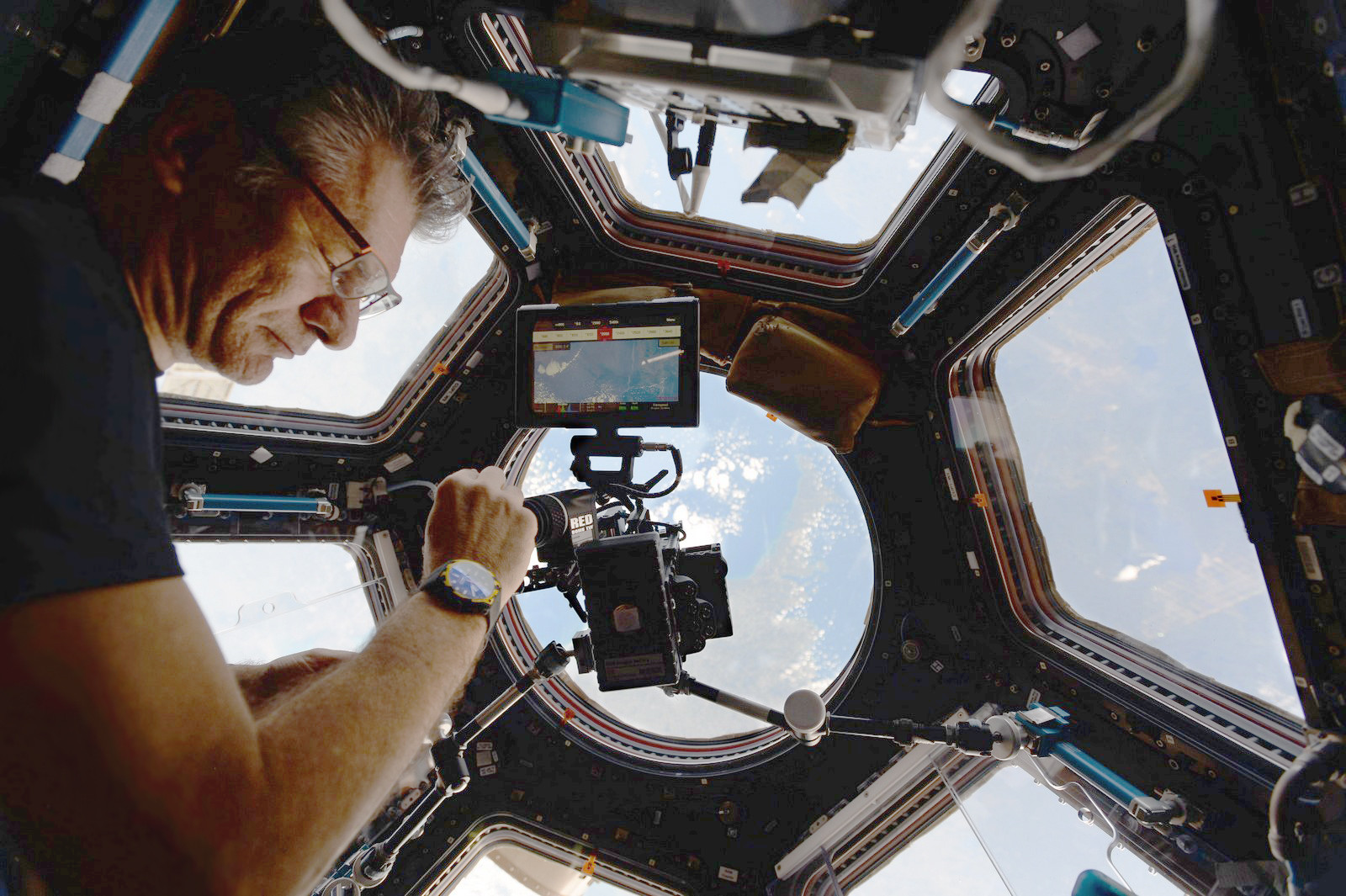
The socio-economic impact of space activities • Oct 2019
Space activities and capabilities fuel industrial competitiveness, economic growth and innovation and are today essential to the European economy, reaching well beyond the aerospace sector.
As space becomes more integrated into the daily lives of citizens, the impact of space activities on economy and society is growing stronger and reaching further.
With an investment worth a movie ticket per citizen per year, ESA is delivering on some of the greatest challenges in science and technology and fostering European scientific excellence, building on 50 years of experience and preparing for the future decades.
In addition, ESA’s spending in industry and academia ripple throughout the European economy, supporting critical industries, creating new businesses and jobs, and attracting students to science and engineering.
Every euro invested in ESA programmes has a significant impact on the European economy, with up to 4 euros created in the broader economy. Investing in ESA programmes also generates significant governmental revenues: up to 90% of the funding of ESA programmes are returned to governments as income tax, taxes on products (including value added tax) and social security contributions.
The economic impact of space fares very well when compared to other key industrial sectors, which demonstrates the strong performance of the space industry in creating additional value for the European economy. A key reason for this high impact comes from the fact that the European space industry covers the full value chain. In addition, the European public funding for space is mostly spent in the domestic industry.
The Member States’ investments in ESA programmes generate a succession of economic impacts, i.e. direct, indirect, and induced ones, from the economic impact of manufacturing and launching space systems to the value created in the wider economy. Space infrastructure also delivers essential public services and is an enabler of other domains. Additional value is therefore generated by revenues that are uniquely supported by space systems. In addition, ESA programmes generate strategic impacts. For instance, they foster European leadership and promote international cooperation. They also produce scientific and technological benefits well beyond the programmes’ objectives, as well as numerous societal impacts, including attracting students to science and engineering.
In the context of the preparation of the Council meetings at Ministerial level, ESA contracts out socio-economic impact assessments now on almost all of its domains of activity, demonstrating the emphasis given to the socio-economic benefits of space activities and to their independent evaluation.
It is important to note that there is no standard approach to assess the socio-economic impacts of space programmes in general and even more so to assess the impacts of all ESA programmes. The methodology of all the assessments conducted is harmonised to the extent possible, in line with recognised standards, but also tailored to the mandate and strategic objectives of the programmes and respective stakeholders’ interests. The specificities of the programmes imply differences in the scope and parameters of the impact assessments, be it the timeframe for the analysis, the availability of underlying data and data sources or an emphasis on certain types of impacts. For that reason, the results of the various assessments are independent for each study and a direct comparison between the results is only possible to a very limited extent.
ESA invests in technologies and discoveries for the future, and in the process, delivers social and economic impacts that benefit Europe today. No single metric can capture the returns from ESA’s activities, as their many dimensions and benefits extends far beyond space.
ESA invests in technology and the European industry in all important areas to foster competitiveness: R&D, technology, manufacturing. This investment generates know-how, new markets, spin-offs and technology transfers, improving the daily life of European citizens.
ESA stimulates innovation and business growth. Each euro invested in ESA programmes attracts up to 2.8 euros of additional investment from third parties. Investing in ESA programmes generates significant commercial revenues for European industry and operators.
ESA promotes collaboration and supports international relations strengthening European and Member States’ space diplomacy through collaborative research and development with international partners, supporting the European industry on the export markets, fostering a strong, innovative economy, and advancing international order that promotes peace and security.
ESA inspires people and young generations as a valued source of scientific data and knowledge, reaching out to scholars, students and teachers, as well as to the public through social networks and international public events.
More articles of the category: Space Economy Articles
Space-based Solar Power: Contributing to achieving Net Zero...
Beyond Borders: Satellite Applications for Humanitarian Emer...
OECD Policy Paper: How the War in Ukraine is affecting Spac...
ESA Space Operations and Space Safety activities: supporting...
Seven Benefit Case Studies of ESA's Space Safety programme
ESA ARTES Partnership Projects, providing the satcom industr...
ESA Science Core Technology Development Success Story - Grou...
European Centre for Space Economy and Commerce (ECSECO) conc...
Europe decides to increase ESA’s budget by 17% compared to t...
The European Commission publishes the 2021 Edition of its Be...
OECD’s examination of Space Technology Transfers and their C...
PwC’s ‘Lunar market assessment: market trends and challenges...
FutureEO, critical enabler of EO benefits for the European e...
ESA TIA ARTES programme’s continuous boost to the commercial...
Terrae Novae: from inspiring Europe’s generations to support...
Exploiting the remarkable potential of space technology tran...
Technology developments for ESA science missions empowering...
Space Economy activities to support ESA Council at Ministeri...
ESA Space Economy Team presents a paper on “Statistic and th...
ESA-Eurostat workshop on a European Space Economy Satellite...
European Centre for Space Economy and Commerce (ECSECO) offi...
European Centre for Space Economy and Commerce (ECSECO) pres...
ESPI Yearbook 2021 – Space Policies, Issues, and Trends of t...
ESA Science Core Technology Development Success Story - Broa...
ESA Science Core Technology Development Success Story - Game...
ESA Science Core Technology Development Success Story - Fost...
ESA Science Core Technology Development Success Story - Crit...
ESA Science Core Technology Development Success Story - Unri...
ESA Science Core Technology Development Success Story - Firs...
ESA Technology Transfer Success Story - Closing the loop: ho...
ESA Technology Transfer Success Story - The missing layer: h...
ESA Technology Transfer Success Story - Cities as Spaceships...
ESA Technology Transfer Success Story - Space-style control...
ESA Technology Transfer Success Story - Using space heritage...
ESA Technology Transfer Success Story - No such thing as a w...
ESA Technology Transfer Success Story - Powering a village f...
ESA Technology Transfer Success Story - Space at home: using...
ESA Technology Transfer Success Story - Landing zone assessm...
ESA Technology Transfer Success Story - Uncovering the secre...
ESA Technology Transfer Success Story - From space debris to...
ESA Technology Transfer Success Story - Dry electrodes to mo...
ESA Technology Transfer Success Story - A new perspective: s...
Eurospace releases its annual Facts & Figures Report: The Eu...
ESPI Space Venture 2021 – Entrepreneurship and Investment in...
ECSECO open for membership registration on its official webs...
OECD's analysis of the impacts of Covid-19 on the Space indu...
Post-crisis scenarios for the space industry
Resilience of the space sector to the Covid-19 crisis
China’s Space Sector: Commercialisation with Chinese Charact...
The socio-economic value of satellite Earth observations: hu...
ESA Centre to develop Europe’s Space Economy and promote com...
The OECD Space Forum launches second phase of research oppor...
EARSC showcasing Copernicus uses for Environmental Complianc...
The OECD’s stand of “What is Impact Assessment”
Creation of the European Centre for Space Economy and Commer...
Value created by ESA's Space Systems for Safety and Security...
A closer look at the European Commission’s Guide to Cost-Ben...
EUSPA publishes EO and GNSS Market Report 2022
BEA’s “Estimating the United States Space Economy Using Inpu...
A closer look at the latest Earth Observation Services Indus...
ESPI Yearbook 2020 – Monitoring the development of the Europ...
EARSC workshop showcasing 24 Copernicus Sentinel value case...
SPAC and the Space Industry
G20 Space Economy Leaders Meeting 2021
ESA joins the Universeh inaugural conference to address the...
OECD’s approach to space sustainability and the economics of...
ESA announces winners of the Global Space Markets Challenge
Global Space Markets Challenge: Longlists announced
Top 12 companies selected in Global Space Markets Challenge
The Size & Health of the UK Space industry in 2019
Global Space Markets Challenge Competition
Copernicus Sentinel data supporting the pulp and paper indus...
Entrepreneurship and private investment trends in the Europe...
Metalysis–ESA Grand Challenge: team Malt wins first phase
Space Architecture: Economic impacts, future developments an...
ESA_Lab@UCLan: Assessing the public value of ESA programmes
ESA_Lab@Kozminski: A new bird in the nest of ESA_Lab
Call for participants: OECD's initiative on the value and su...
Financing SMEs: options for SMEs and Midcaps in Europe
Copernicus Sentinel Data supporting wine making in France
ESA_Lab@PoliBa: De’ remi facemmo ali
OECD’s analysis of the impacts of Covid-19 on the space indu...
Financing space: options for SMEs and midcaps in Europe
Discussing impact assessment of Big Science projects during...
ESA and Metalysis Organised the First Grand Challenge Midter...
Why it is important to keep investing in space during and af...
The benefits of Copernicus’ Sentinel data to society, enviro...
Join the First Online Global Space Economic Workshop
Join the Third Online Global Space Economic Workshop
Join the Second Online Global Space Economic Workshop
Watch again the GSEW Online
A closer look at OECD’s methodology for assessing the scient...
Non-space business? We want to hear from you
Discussing solutions at the Global Space Economic Workshop
The Covid Crisis: for European SMEs, this could be a breakth...
Value created by ESA's Clean Space Initiative
Value created by ESA's Ground Systems Engineering and Operat...
Value created by ESA Science Programme
Value created by ESA's Future Earth Observation Pillar
Value created by ESA Telecommunication Partnership Projects
ESA and Metalysis decide to suspend temporarily the Grand Ch...
Two Teams Competing for a Half-million Prize
Watch again the GSEF 19
Interview with Eric Morel de Westgaver on Europe's space eco...
Global Space Economic Forum: Space Creates Value
ESA at the New Space Economy European Expoforum
Kick off of Metalysis – ESA Grand Challenge: the Race to Min...
ESA Grand Challenge rewards solutions to complex problems
Advancing the understanding and measurement of the societal...
ESA Space Economy Brochure
ESA at the New Space Economy European Expoforum
Space cybersecurity for smart cities
Setting the stage
Compete in a lunar economy
Last chance to join the competition
Interview with Giulia Pastorella on cybersecurity
Interview with Guglielmo Baeli on the oil and gas sector
Interview with Vincent Bastide on construction
Global Space Economic Workshop
Global Space Economic Workshop
Building cybersecurity at the Global Space Economic Workshop
ESA announces first Global Space Economic Forum
Welcome to the Global Space Economic Workshop
ESA Global Space Economic Forum
What is the Space Economy?
Measuring the Space Economy
Creating value
Challenges of future urban settlements on the Moon and Mars
Building and powering by disruptive innovation
Space workshops to power urban innovation
ESA at Station F: looking for applications to the first Gran...
Game changers for the ESA Grand Challenge
The Moon Race: Pioneering Sustainable Lunar Exploration
Metalysis–ESA Grand Challenge launched
A community of innovation at the Farnborough Airshow and ESA
Join us at Le Bourget to discuss space for commercial purpos...
Fuel the future by joining the Innovation Exchange
